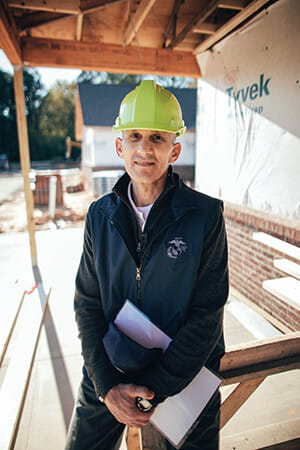How does one move forward after mental or physical trauma?

After experiencing a devastating career setback due to medical complications, Dr. Thomas Gorry ’18, a PhD in Management graduate, combined his Walden education with his military experience to help other veterans in need, becoming executive director of the Veterans Life Center of North Carolina, slated to open in Butner, North Carolina, this year.
Gorry served in the United States Marine Corps for 32 years, beginning as a strategic planner and logistician in 1985. He was deeply involved in higher education throughout his career. Prior to pursuing his doctorate in 2013, he earned three master’s degrees—including an MBA from Webster University—and served as an adjunct professor at four universities, teaching courses in business management, leadership, and military strategy, among other topics.
Later, he completed two work assignments in the academic field, first as the commandant of the Dwight D. Eisenhower School for National Security and Resource Strategy, a college of the National Defense University in Washington, D.C., and second as president of Marine Corps University, a professional military education university system in Quantico, Virginia.
“Education was always an important part of my career,” he says. “It made me a better officer and a better leader. It made me a more well-rounded person.”
Gorry deployed to Afghanistan in 2009 during Operation Enduring Freedom and served as the joint operations officer for U.S. Forces Afghanistan. Subsequently, he was promoted to brigadier general, and was later named commanding general of the Marine Corps installations on the East Coast.
While in Afghanistan, he severely injured his back, and after returning home in May 2010, he developed painful digestive problems. These issues worsened as he spent the next six years in doctors’ offices hoping to receive an official medical diagnosis. In 2016, he developed a septic infection and was rushed to the emergency room. He underwent surgery to cure the infection, and several surgeries on his back followed. During his recovery, a visiting colleague told him his physical condition would likely mean the end of his military career.
“You have your career that you spent the last 30 years building, and now all of a sudden, that’s being taken away from you,” Gorry says. “My colleague said to me, ‘You have to give yourself time to grieve.’ But I wanted to move on as quickly as possible. I wanted to use my experience to help others.”
Gorry retired from the Marine Corps in 2017 and moved with his wife to Raleigh, North Carolina. His physical and mental struggles inspired him to write his PhD dissertation on organizational support for wounded, ill, and injured Marine veterans. He used the U.S. Marine Corps Wounded Warrior Regiment as a case study.
“All too often, veterans have invisible mental wounds that cause them to get stuck in a negative cycle,” he says.
“They start having family issues, they lose their jobs, or they turn to alcohol and drugs. We are seeing increased homelessness, increased unemployment, and—most tragically—high suicide rates. My dissertation focused on why agencies must better support veterans so we can change these statistics.”
Soon after Gorry’s Walden graduation, he applied for and was appointed to the role of executive director of the newly founded Veterans Life Center of North Carolina. The center will offer a residential program designed to help at-risk veterans pursue career opportunities and reintegrate into the community by strengthening their mental fitness and physical health, improving life skills, and completing vocational training.
When construction is finished, the center will have over 100 beds and shower and bathroom facilities in each of its four wings. There will be a full commercial kitchen and dining room, a large multipurpose room, two day rooms, a library, a computer lab, a conference room, a store, a dispensary, a nurse/first aid room, and two laundry rooms, as well as office space for more than 30 staff members.
“The center will be a safe, secure environment for veterans to live as they get the support they need to move forward,” Gorry says. “We want to help them create a new image of themselves by focusing not on past trauma, but on their future path.”
Looking to his own future, Gorry says that after the center becomes established, he would like to write and publish a book. He adds that he keeps in touch with his Walden mentor, Dr. Joseph Barbeau, along with several of his classmates.
“My Walden education has inspired me to share my story and use my experiences to help other people,” he says. “I am committed to creating positive social change in my community and using my degree for a higher purpose.”




